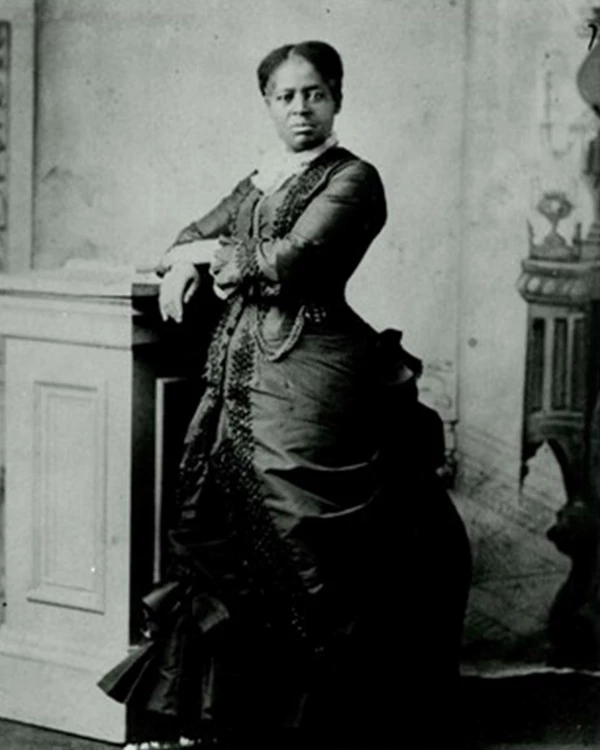Last updated: February 16, 2023
Person
Lucretia Marshbanks

Museum of the American West
Lucretia Marshbanks was one of the first black women to venture to the Black Hills of South Dakota. She was a cook, boarding house manager, hotel owner, and ranch owner. This determined and enterprising woman left such an impact on the area that a character in the HBO series Deadwood was inspired by her.
Lucretia’s father was a product of an all-too-common situation, a child of an enslaved woman and her white enslaver. He married and had eleven children, of which Lucretia was the oldest. As a teenager, Lucretia was gifted to her half-cousin, Ann Marchbanks. Ann traveled with her husband to California during the gold rush and they brought Lucretia with them. There Lucretia saw the possibilities economic opportunity in the West for a black woman before returning to the East.
Lucretia was freed during the Civil War. She and several of her siblings moved to Colorado in the mining camps. By 1876, she had heard of Custer’s gold discovery in the Dakota Territory and traveled to the famous gold mining town of Deadwood.
Lucretia had experience with cooking and got a job as the kitchen manager in the Grand Central Hotel. Soon, the hotel was known for the cooking of “Aunt Lou.” Lucretia worked various jobs in the area including managing the boardinghouse of the Father DeSmet Mine.
She was considered by many to be the finest cook in the Black Hills. She once baked a mincemeat pie that a man enjoyed so much, he bought her a silk dress when he struck gold in 1881. This is the dress she is wearing in the professional photograph taken of her later that year.
She was very popular among the residents of the Black Hills. In 1879, the community held a fundraiser to build a Congregational church. It was a raffle to vote for the most popular woman in the Black Hills with a diamond ring as a prize. Over thirteen hundred votes were cast, and Lucretia won (against two white women) with 652 votes.
“Aunt Lou is an old and highly respected colored lady who has had charge of the superintendent's establishment of the DeSmet mine as housekeeper, cook and the superintendent of all the superintendents who have ever been employed on the mine. Her accomplishments as a culinary artist are beyond all praise. She rules the ranch where she presides with autocratic power by divine right, brooking no cavil or presumptuous interference….no one stands higher in the community than the sable lady of the DeSmet.” (Black Hills Daily Times, 12 December 1881)
Lucretia purchased a boarding house in Sawpit Gulch in 1883 and named it Rustic Hotel. A few years later she decided to move out of the city. She bought a homestead ranch from Abner Settle across the border in Wyoming. She sold the hotel, purchased cattle, and began ranching in the valley between Beulah and Sundance, Wyoming.
Lucretia was an active part of her rural neighborhood, and many grew to consider her as a second mother. Her neighbors called on her to act as a midwife and at least one white child was named for her. Her nephew, Burr Officer, and his son Ted moved to the area in 1896. Burr applied for homestead north of her ranch. Over the years, Lucretia expanded her holdings to include an additional 240 acres under the Homestead Act.
After several decades of running her ranch, her health began to fail. She passed away in 1911. The funeral was held in her house, and a large crowd of friends and family–both white and black–attended.
Sources and Additional Reading:
- “Aunt Lou Marshbanks.” Lead Daily Call. 24 November 1911, p. 5. Newspapers.com https://www.newspapers.com/image/93553584/ (need account to view)
- Bureau of Land Management. General Land Office Records. Abner C Settle. Issued 17 October 1889. 160 acres. https://glorecords.blm.gov/details/patent/default.aspx?accession=WY0130__.238&docClass=STA&sid=tva3kvuh.1h0
- Bureau of Land Management. General Land Office Records. Heirs of Lucrecia Marshbanks. Issued 19 November 1912. 160 acres. https://glorecords.blm.gov/details/patent/default.aspx?accession=300998&docClass=SER&sid=j11ff0av.tdm#patentDetailsTabIndex=0
- Bureau of Land Management. General Land Office Records. Heirs of Lucrecia Marshbanks. Issued 27 October 1916. 83.17 acres. https://glorecords.blm.gov/details/patent/default.aspx?accession=552191&docClass=SER&sid=j11ff0av.tdm#patentDetailsTabIndex=0
- Bureau of Land Management. General Land Office Records. Burr W Officer. Issued 6 November 1918. 162.19 acres. https://glorecords.blm.gov/details/patent/default.aspx?accession=652862&docClass=SER&sid=qrslsp5p.zgg#patentDetailsTabIndex=0
- Find a Grave. Lucretia “Aunt Lou” Marshbanks. Accessed February 16, 2023. https://www.findagrave.com/memorial/6542009/lucretia-marshbanks
- Guenther, Todd. “Lucretia Marchbanks: A Black Woman in the Black Hills.” South Dakota History. Volume 31:1. Spring 2001. pp. 1-25. https://sdhspress.com/journal/south-dakota-history-31-1/lucretia-marchbanks-a-black-woman-in-the-black-hills/vol-31-no-1-lucretia-marchbanks.pdf
- Pengra, Lilah. “Lucretia Marchbanks (1832-1911). BlackPast.org. May 18, 2009. https://www.blackpast.org/african-american-history/people-african-american-history/lucretia-marchbanks-1832-1911
- “Pioneer-Day Wyo. Ranch Was Sold.” The Weekly Pioneer-Times. 16 May 1940, p. 3. Newspapers.com. https://www.newspapers.com/image/263381361/ (need account to view)
- Whitlock, David K. “Former Slave Played Important Role During Deadwood’s Early Days.” Destination Deadwood. April 28, 2008. https://www.bhpioneer.com/deadwood/lucretia-aunt-lou-marchbanks-was-a-beloved-figure/article_860b9ec1-a536-5da6-a79a-4e2ab584e9ba.html
- “Hill Gold Miner Appreciated Pioneer Negro Woman.” Rapid City Journal. 22 July 1948, p. 8. Newspapers.com https://www.newspapers.com/image/350645619/ (need account to view)
- “Up Gulch Tailings” The Black Hills Daily Times. 15 August 1879, p. 4. Newspapers.com. https://www.newspapers.com/image/262714250/ (need account to view)
- “We’ll Tell You Who She Is.” Black Hills Daily Times, 12 December 1881, p. 4. Newspapers.com. https://www.newspapers.com/image/132849979/ (need account to view)
